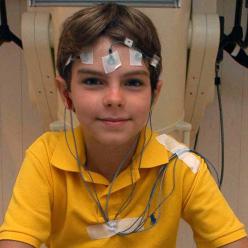Medications
According to several systematic reviews, good evidence suggests that stimulant medications such as Ritalin or amphetamines can reduce the symptoms of ADHD in children. The evidence is so persuasive that the American Academy of Pediatrics includes the use of stimulants as one of its top clinical guideline recommendations for treating the disorder. This strong recommendation coexists, however, alongside a number of other options for treatment and questions about how ADHD therapies might be tailored to specific patient groups.
The medications that seem to be the most effective are a class of drugs known as stimulants. Following is a list of the stimulants, their trade (or brand) names, and their generic names. “Approved age” means that the drug has been tested and found safe and effective in children of that age.
|
Trade Name |
Generic Name |
Approved Age |
|---|---|---|
| Adderall | amphetamine | 3 and older |
| Concerta | methylphenidate (long acting) |
6 and older |
| Cylert* | pemoline | 6 and older |
| Dexedrine | dextroamphetamine | 3 and older |
| Dextrostat | dextroamphetamine | 3 and older |
| Focalin | dexmethylphenidate | 6 and older |
| Metadate ER | methylphenidate (extended release) |
6 and older |
| Metadate CD | methylphenidate (extended release) |
6 and older |
| Ritalin | methylphenidate | 6 and older |
| Ritalin SR | methylphenidate (extended release) |
6 and older |
| Ritalin LA | methylphenidate (long acting) |
6 and older |
| *Because of its potential for serious side effects affecting the liver, Cylert should not ordinarily be considered as first-line drug therapy for ADHD. |
The U.S. Food and Drug Adminstration (FDA) recently approved a medication for ADHD that is not a stimulant. The medication, Strattera®, or atomoxetine, works on the neurotransmitter norepinephrine, whereas the stimulants primarily work on dopamine. Both of theses neurotransmitters are believed to play a role in ADHD. More studies will need to be done to contrast Strattera with the medications already available, but the evidence to date indicates that over 70 percent of children with ADHD given Strattera manifest significant improvement in their symptoms.
Some people get better results from one medication, some from another. It is important to work with the prescribing physician to find the right medication and the right dosage. For many people, the stimulants dramatically reduce their hyperactivity and impulsivity and improve their ability to focus, work, and learn. The medications may also improve physical coordination, such as that needed in handwriting and in sports.
The stimulant drugs, when used with medical supervision, are usually considered quite safe. Stimulants do not make the child feel “high,” although some children say they feel different or funny. Such changes are usually very minor. Although some parents worry that their child may become addicted to the medication, to date there is no convincing evidence that stimulant medications, when used for treatment of ADHD, cause drug abuse or dependence. A review of all long-term studies on stimulant medication and substance abuse, conducted by researchers at Massachusetts General Hospital and Harvard Medical School, found that teenagers with ADHD who remained on their medication during the teen years had a lower likelihood of substance use or abuse than did ADHD adolescents who were not taking medications.
The stimulant drugs come in long- and short-term forms. The newer sustained-release stimulants can be taken before school and are long-lasting so that the child does not need to go to the school nurse every day for a pill. The doctor can discuss with the parents the child’s needs and decide which preparation to use and whether the child needs to take the medicine during school hours only or in the evening and on weekends too.
If the child does not show symptom improvement after taking a medication for a week, the doctor may try adjusting the dosage. If there is still no improvement, the child may be switched to another medication. About one out of ten children is not helped by a stimulant medication. Other types of medication may be used if stimulants don’t work or if the ADHD occurs with another disorder. Antidepressants and other medications can help control accompanying depression or anxiety.
Sometimes the doctor may prescribe for a young child a medication that has been approved by the FDA for use in adults or older children. This use of the medication is called “off label.” Many of the newer medications that are proving helpful for child mental disorders are prescribed off label because only a few of them have been systematically studied for safety and efficacy in children. Medications that have not undergone such testing are dispensed with the statement that “safety and efficacy have not been established in pediatric patients.”
Side effects of the medications
Most side effects of the stimulant medications are minor and are usually related to the dosage of the medication being taken. Higher doses produce more side effects. The most common side effects are decreased appetite, insomnia, increased anxiety, and/or irritability. Some children report mild stomach aches or headaches.
Appetite seems to fluctuate, usually being low during the middle of the day and more normal by suppertime. Adequate amounts of food that is nutritional should be available for the child, especially at peak appetite times.
If the child has difficulty falling asleep, several options may be tried – a lower dosage of the stimulant, giving the stimulant earlier in the day, discontinuing the afternoon or evening dosage, or giving an adjunct medication such as a low-dosage antidepressant or clonidine. A few children develop tics during treatment. These can often be lessened by changing the medication dosage. A very few children cannot tolerate any stimulant, no matter how low the dosage. In such cases, the child is often given an antidepressant instead of the stimulant.
When a child’s schoolwork and behavior improve soon after starting medication, the child, parents, and teachers tend to applaud the drug for causing the sudden changes. Unfortunately, when people see such immediate improvement, they often think medication is all that’s needed. But medications don’t cure ADHD; they only control the symptoms on the day they are taken. Although the medications help the child pay better attention and complete school work, they can’t increase knowledge or improve academic skills. The medications help the child to use those skills he or she already possesses.
Behavioral therapy, emotional counseling, and practical support will help ADHD children cope with everyday problems and feel better about themselves.
Facts to remember about medication for ADHD
- Medications for ADHD help many children focus and be more successful at school, home, and play. Avoiding negative experiences now may actually help prevent addictions and other emotional problems later.
- About 80 percent of children who need medication for ADHD still need it as teenagers. Over 50 percent need medication as adults.
Medication for the child with both ADHD and bipolar disorder
Since a child with bipolar disorder will probably be prescribed a mood stabilizer such as lithium or Depakote®, the doctor will carefully consider whether the child should take one of the medications usually prescribed for ADHD. If a stimulant medication is prescribed, it may be given in a lower dosage than usual.
Behavior therapy
Behavior therapy is an alternative treatment pursued by the significant number of patients who do not respond to stimulants or are reluctant to take the drugs. Many patients also supplement their drug treatment with some kind of behavior therapy. The evidence for behavior therapy’s effectiveness is much weaker than the evidence for stimulant medications, however, and almost all studies comparing behavior therapy with stimulants alone indicate a much stronger effect from stimulants than from behavior therapy. Behavior therapy is not without some supporting data, although few high quality studies of the treatment exist.
Research shows that behavior therapy can be particularly good for certain subgroups within ADHD patients, for example, children who have poor relationships with parents or lots of opposition and aggression in the family. ADHD is a unique chronic disorder that might also be treated in some cases with educational therapy, although very little information exists on such treatment.
Which treatment should my child have?
For children with ADHD, no single treatment is the answer for every child. A child may sometimes have undesirable side effects to a medication that would make that particular treatment unacceptable. And if a child with ADHD also has anxiety or depression, a treatment combining medication and behavioral therapy might be best. Each child’s needs and personal history must be carefully considered.

